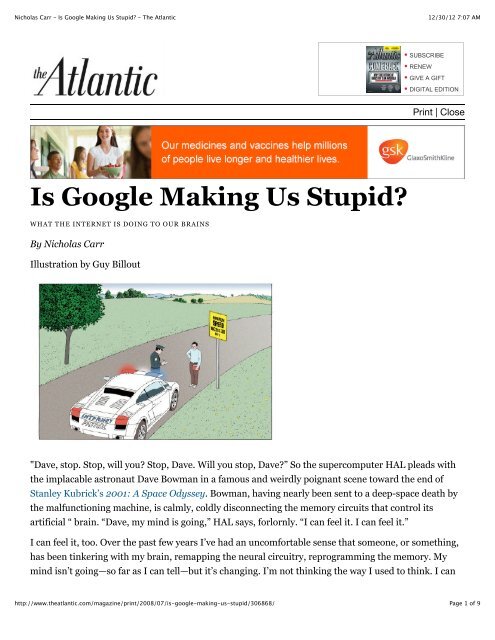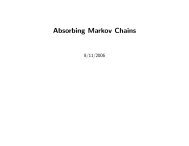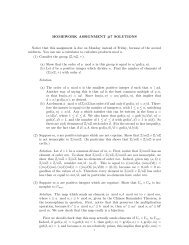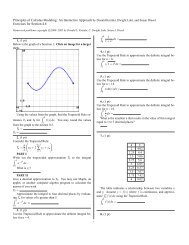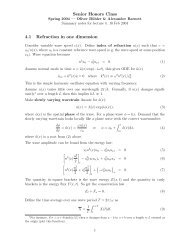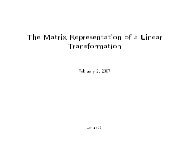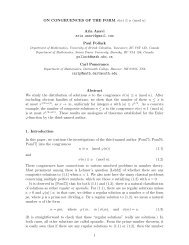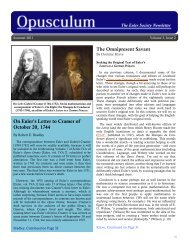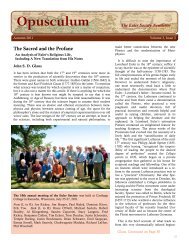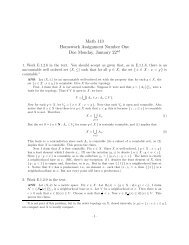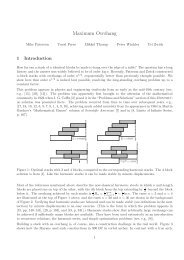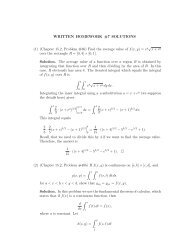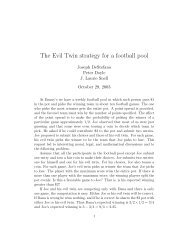Nicholas Carr - Is Google Making Us Stupid? - The Atlantic
Nicholas Carr - Is Google Making Us Stupid? - The Atlantic
Nicholas Carr - Is Google Making Us Stupid? - The Atlantic
You also want an ePaper? Increase the reach of your titles
YUMPU automatically turns print PDFs into web optimized ePapers that Google loves.
<strong>Nicholas</strong> <strong>Carr</strong> - <strong>Is</strong> <strong>Google</strong> <strong>Making</strong> <strong>Us</strong> <strong>Stupid</strong>? - <strong>The</strong> <strong>Atlantic</strong><br />
<strong>Is</strong> <strong>Google</strong> <strong>Making</strong> <strong>Us</strong> <strong>Stupid</strong>?<br />
WHAT THE INTERNET IS DOING TO OUR BRAINS<br />
By <strong>Nicholas</strong> <strong>Carr</strong><br />
Illustration by Guy Billout<br />
http://www.theatlantic.com/magazine/print/2008/07/is-google-making-us-stupid/306868/<br />
12/30/12 7:07 AM<br />
• SUBSCRIBE<br />
• RENEW<br />
• GIVE A GIFT<br />
• DIGITAL EDITION<br />
Print | Close<br />
"Dave, stop. Stop, will you? Stop, Dave. Will you stop, Dave?” So the supercomputer HAL pleads with<br />
the implacable astronaut Dave Bowman in a famous and weirdly poignant scene toward the end of<br />
Stanley Kubrick’s 2001: A Space Odyssey. Bowman, having nearly been sent to a deep-space death by<br />
the malfunctioning machine, is calmly, coldly disconnecting the memory circuits that control its<br />
artificial “ brain. “Dave, my mind is going,” HAL says, forlornly. “I can feel it. I can feel it.”<br />
I can feel it, too. Over the past few years I’ve had an uncomfortable sense that someone, or something,<br />
has been tinkering with my brain, remapping the neural circuitry, reprogramming the memory. My<br />
mind isn’t going—so far as I can tell—but it’s changing. I’m not thinking the way I used to think. I can<br />
Page 1 of 9
<strong>Nicholas</strong> <strong>Carr</strong> - <strong>Is</strong> <strong>Google</strong> <strong>Making</strong> <strong>Us</strong> <strong>Stupid</strong>? - <strong>The</strong> <strong>Atlantic</strong><br />
12/30/12 7:07 AM<br />
feel it most strongly when I’m reading. Immersing myself in a book or a lengthy article used to be easy.<br />
My mind would get caught up in the narrative or the turns of the argument, and I’d spend hours<br />
strolling through long stretches of prose. That’s rarely the case anymore. Now my concentration often<br />
starts to drift after two or three pages. I get fidgety, lose the thread, begin looking for something else to<br />
do. I feel as if I’m always dragging my wayward brain back to the text. <strong>The</strong> deep reading that used to<br />
come naturally has become a struggle.<br />
I think I know what’s going on. For more than a decade now, I’ve been spending a lot of time online,<br />
searching and surfing and sometimes adding to the great databases of the Internet. <strong>The</strong> Web has been<br />
a godsend to me as a writer. Research that once required days in the stacks or periodical rooms of<br />
libraries can now be done in minutes. A few <strong>Google</strong> searches, some quick clicks on hyperlinks, and I’ve<br />
got the telltale fact or pithy quote I was after. Even when I’m not working, I’m as likely as not to be<br />
foraging in the Web’s info-thickets’reading and writing e-mails, scanning headlines and blog posts,<br />
watching videos and listening to podcasts, or just tripping from link to link to link. (Unlike footnotes,<br />
to which they’re sometimes likened, hyperlinks don’t merely point to related works; they propel you<br />
toward them.)<br />
For me, as for others, the Net is becoming a universal medium, the conduit for most of the information<br />
that flows through my eyes and ears and into my mind. <strong>The</strong> advantages of having immediate access to<br />
such an incredibly rich store of information are many, and they’ve been widely described and duly<br />
applauded. “<strong>The</strong> perfect recall of silicon memory,” Wired’s Clive Thompson has written, “can be an<br />
enormous boon to thinking.” But that boon comes at a price. As the media theorist Marshall McLuhan<br />
pointed out in the 1960s, media are not just passive channels of information. <strong>The</strong>y supply the stuff of<br />
thought, but they also shape the process of thought. And what the Net seems to be doing is chipping<br />
away my capacity for concentration and contemplation. My mind now expects to take in information<br />
the way the Net distributes it: in a swiftly moving stream of particles. Once I was a scuba diver in the<br />
sea of words. Now I zip along the surface like a guy on a Jet Ski.<br />
I’m not the only one. When I mention my troubles with reading to friends and acquaintances—literary<br />
types, most of them—many say they’re having similar experiences. <strong>The</strong> more they use the Web, the<br />
more they have to fight to stay focused on long pieces of writing. Some of the bloggers I follow have<br />
also begun mentioning the phenomenon. Scott Karp, who writes a blog about online media, recently<br />
confessed that he has stopped reading books altogether. “I was a lit major in college, and used to be [a]<br />
voracious book reader,” he wrote. “What happened?” He speculates on the answer: “What if I do all my<br />
reading on the web not so much because the way I read has changed, i.e. I’m just seeking convenience,<br />
but because the way I THINK has changed?”<br />
Bruce Friedman, who blogs regularly about the use of computers in medicine, also has described how<br />
the Internet has altered his mental habits. “I now have almost totally lost the ability to read and absorb<br />
a longish article on the web or in print,” he wrote earlier this year. A pathologist who has long been on<br />
the faculty of the University of Michigan Medical School, Friedman elaborated on his comment in a<br />
http://www.theatlantic.com/magazine/print/2008/07/is-google-making-us-stupid/306868/<br />
Page 2 of 9
<strong>Nicholas</strong> <strong>Carr</strong> - <strong>Is</strong> <strong>Google</strong> <strong>Making</strong> <strong>Us</strong> <strong>Stupid</strong>? - <strong>The</strong> <strong>Atlantic</strong><br />
12/30/12 7:07 AM<br />
telephone conversation with me. His thinking, he said, has taken on a “staccato” quality, reflecting the<br />
way he quickly scans short passages of text from many sources online. “I can’t read War and Peace<br />
anymore,” he admitted. “I’ve lost the ability to do that. Even a blog post of more than three or four<br />
paragraphs is too much to absorb. I skim it.”<br />
Anecdotes alone don’t prove much. And we still await the long-term neurological and psychological<br />
experiments that will provide a definitive picture of how Internet use affects cognition. But a recently<br />
published study of online research habits , conducted by scholars from University College London,<br />
suggests that we may well be in the midst of a sea change in the way we read and think. As part of the<br />
five-year research program, the scholars examined computer logs documenting the behavior of visitors<br />
to two popular research sites, one operated by the British Library and one by a U.K. educational<br />
consortium, that provide access to journal articles, e-books, and other sources of written information.<br />
<strong>The</strong>y found that people using the sites exhibited “a form of skimming activity,” hopping from one<br />
source to another and rarely returning to any source they’d already visited. <strong>The</strong>y typically read no more<br />
than one or two pages of an article or book before they would “bounce” out to another site. Sometimes<br />
they’d save a long article, but there’s no evidence that they ever went back and actually read it. <strong>The</strong><br />
authors of the study report:<br />
It is clear that users are not reading online in the traditional sense; indeed there are signs that<br />
new forms of “reading” are emerging as users “power browse” horizontally through titles,<br />
contents pages and abstracts going for quick wins. It almost seems that they go online to avoid<br />
reading in the traditional sense.<br />
Thanks to the ubiquity of text on the Internet, not to mention the popularity of text-messaging on cell<br />
phones, we may well be reading more today than we did in the 1970s or 1980s, when television was our<br />
medium of choice. But it’s a different kind of reading, and behind it lies a different kind of thinking—<br />
perhaps even a new sense of the self. “We are not only what we read,” says Maryanne Wolf, a<br />
developmental psychologist at Tufts University and the author of Proust and the Squid: <strong>The</strong> Story and<br />
Science of the Reading Brain. “We are how we read.” Wolf worries that the style of reading promoted<br />
by the Net, a style that puts “efficiency” and “immediacy” above all else, may be weakening our capacity<br />
for the kind of deep reading that emerged when an earlier technology, the printing press, made long<br />
and complex works of prose commonplace. When we read online, she says, we tend to become “mere<br />
decoders of information.” Our ability to interpret text, to make the rich mental connections that form<br />
when we read deeply and without distraction, remains largely disengaged.<br />
Reading, explains Wolf, is not an instinctive skill for human beings. It’s not etched into our genes the<br />
way speech is. We have to teach our minds how to translate the symbolic characters we see into the<br />
language we understand. And the media or other technologies we use in learning and practicing the<br />
craft of reading play an important part in shaping the neural circuits inside our brains. Experiments<br />
demonstrate that readers of ideograms, such as the Chinese, develop a mental circuitry for reading that<br />
http://www.theatlantic.com/magazine/print/2008/07/is-google-making-us-stupid/306868/<br />
Page 3 of 9
<strong>Nicholas</strong> <strong>Carr</strong> - <strong>Is</strong> <strong>Google</strong> <strong>Making</strong> <strong>Us</strong> <strong>Stupid</strong>? - <strong>The</strong> <strong>Atlantic</strong><br />
is very different from the circuitry found in those of us whose written language employs an alphabet.<br />
<strong>The</strong> variations extend across many regions of the brain, including those that govern such essential<br />
http://www.theatlantic.com/magazine/print/2008/07/is-google-making-us-stupid/306868/<br />
12/30/12 7:07 AM<br />
cognitive functions as memory and the interpretation of visual and auditory stimuli. We can expect as<br />
well that the circuits woven by our use of the Net will be different from those woven by our reading of<br />
books and other printed works.<br />
Sometime in 1882, Friedrich Nietzsche bought a typewriter—a Malling-Hansen Writing Ball, to be<br />
precise. His vision was failing, and keeping his eyes focused on a page had become exhausting and<br />
painful, often bringing on crushing headaches. He had been forced to curtail his writing, and he feared<br />
that he would soon have to give it up. <strong>The</strong> typewriter rescued him, at least for a time. Once he had<br />
mastered touch-typing, he was able to write with his eyes closed, using only the tips of his fingers.<br />
Words could once again flow from his mind to the page.<br />
But the machine had a subtler effect on his work. One of Nietzsche’s friends, a composer, noticed a<br />
change in the style of his writing. His already terse prose had become even tighter, more telegraphic.<br />
“Perhaps you will through this instrument even take to a new idiom,” the friend wrote in a letter,<br />
noting that, in his own work, his “‘thoughts’ in music and language often depend on the quality of pen<br />
and paper.”<br />
Also see:<br />
Living With a Computer (July 1982)<br />
"<strong>The</strong> process works this way. When I sit down to write a letter or start the first draft of an article, I<br />
simply type on the keyboard and the words appear on the screen..." By James Fallows<br />
“You are right,” Nietzsche replied, “our writing equipment takes part in the forming of our thoughts.”<br />
Under the sway of the machine, writes the German media scholar Friedrich A. Kittler , Nietzsche’s<br />
prose “changed from arguments to aphorisms, from thoughts to puns, from rhetoric to telegram style.”<br />
<strong>The</strong> human brain is almost infinitely malleable. People used to think that our mental meshwork, the<br />
dense connections formed among the 100 billion or so neurons inside our skulls, was largely fixed by<br />
the time we reached adulthood. But brain researchers have discovered that that’s not the case. James<br />
Olds, a professor of neuroscience who directs the Krasnow Institute for Advanced Study at George<br />
Mason University, says that even the adult mind “is very plastic.” Nerve cells routinely break old<br />
connections and form new ones. “<strong>The</strong> brain,” according to Olds, “has the ability to reprogram itself on<br />
the fly, altering the way it functions.”<br />
As we use what the sociologist Daniel Bell has called our “intellectual technologies”—the tools that<br />
extend our mental rather than our physical capacities—we inevitably begin to take on the qualities of<br />
those technologies. <strong>The</strong> mechanical clock, which came into common use in the 14th century, provides a<br />
compelling example. In Technics and Civilization, the historian and cultural critic Lewis Mumford<br />
described how the clock “disassociated time from human events and helped create the belief in an<br />
Page 4 of 9
<strong>Nicholas</strong> <strong>Carr</strong> - <strong>Is</strong> <strong>Google</strong> <strong>Making</strong> <strong>Us</strong> <strong>Stupid</strong>? - <strong>The</strong> <strong>Atlantic</strong><br />
independent world of mathematically measurable sequences.” <strong>The</strong> “abstract framework of divided<br />
time” became “the point of reference for both action and thought.”<br />
http://www.theatlantic.com/magazine/print/2008/07/is-google-making-us-stupid/306868/<br />
12/30/12 7:07 AM<br />
<strong>The</strong> clock’s methodical ticking helped bring into being the scientific mind and the scientific man. But it<br />
also took something away. As the late MIT computer scientist Joseph Weizenbaum observed in his<br />
1976 book, Computer Power and Human Reason: From Judgment to Calculation, the conception of<br />
the world that emerged from the widespread use of timekeeping instruments “remains an<br />
impoverished version of the older one, for it rests on a rejection of those direct experiences that formed<br />
the basis for, and indeed constituted, the old reality.” In deciding when to eat, to work, to sleep, to rise,<br />
we stopped listening to our senses and started obeying the clock.<br />
<strong>The</strong> process of adapting to new intellectual technologies is reflected in the changing metaphors we use<br />
to explain ourselves to ourselves. When the mechanical clock arrived, people began thinking of their<br />
brains as operating “like clockwork.” Today, in the age of software, we have come to think of them as<br />
operating “like computers.” But the changes, neuroscience tells us, go much deeper than metaphor.<br />
Thanks to our brain’s plasticity, the adaptation occurs also at a biological level.<br />
<strong>The</strong> Internet promises to have particularly far-reaching effects on cognition. In a paper published in<br />
1936, the British mathematician Alan Turing proved that a digital computer, which at the time existed<br />
only as a theoretical machine, could be programmed to perform the function of any other information-<br />
processing device. And that’s what we’re seeing today. <strong>The</strong> Internet, an immeasurably powerful<br />
computing system, is subsuming most of our other intellectual technologies. It’s becoming our map<br />
and our clock, our printing press and our typewriter, our calculator and our telephone, and our radio<br />
and TV.<br />
When the Net absorbs a medium, that medium is re-created in the Net’s image. It injects the medium’s<br />
content with hyperlinks, blinking ads, and other digital gewgaws, and it surrounds the content with the<br />
content of all the other media it has absorbed. A new e-mail message, for instance, may announce its<br />
arrival as we’re glancing over the latest headlines at a newspaper’s site. <strong>The</strong> result is to scatter our<br />
attention and diffuse our concentration.<br />
<strong>The</strong> Net’s influence doesn’t end at the edges of a computer screen, either. As people’s minds become<br />
attuned to the crazy quilt of Internet media, traditional media have to adapt to the audience’s new<br />
expectations. Television programs add text crawls and pop-up ads, and magazines and newspapers<br />
shorten their articles, introduce capsule summaries, and crowd their pages with easy-to-browse info-<br />
snippets. When, in March of this year, <strong>The</strong>New York Times decided to devote the second and third<br />
pages of every edition to article abstracts , its design director, Tom Bodkin, explained that the<br />
“shortcuts” would give harried readers a quick “taste” of the day’s news, sparing them the “less<br />
efficient” method of actually turning the pages and reading the articles. Old media have little choice but<br />
to play by the new-media rules.<br />
Never has a communications system played so many roles in our lives—or exerted such broad influence<br />
Page 5 of 9
<strong>Nicholas</strong> <strong>Carr</strong> - <strong>Is</strong> <strong>Google</strong> <strong>Making</strong> <strong>Us</strong> <strong>Stupid</strong>? - <strong>The</strong> <strong>Atlantic</strong><br />
over our thoughts—as the Internet does today. Yet, for all that’s been written about the Net, there’s<br />
been little consideration of how, exactly, it’s reprogramming us. <strong>The</strong> Net’s intellectual ethic remains<br />
obscure.<br />
About the same time that Nietzsche started using his typewriter, an earnest young man named<br />
http://www.theatlantic.com/magazine/print/2008/07/is-google-making-us-stupid/306868/<br />
12/30/12 7:07 AM<br />
Frederick Winslow Taylor carried a stopwatch into the Midvale Steel plant in Philadelphia and began a<br />
historic series of experiments aimed at improving the efficiency of the plant’s machinists. With the<br />
approval of Midvale’s owners, he recruited a group of factory hands, set them to work on various<br />
metalworking machines, and recorded and timed their every movement as well as the operations of the<br />
machines. By breaking down every job into a sequence of small, discrete steps and then testing<br />
different ways of performing each one, Taylor created a set of precise instructions—an “algorithm,” we<br />
might say today—for how each worker should work. Midvale’s employees grumbled about the strict<br />
new regime, claiming that it turned them into little more than automatons, but the factory’s<br />
productivity soared.<br />
More than a hundred years after the invention of the steam engine, the Industrial Revolution had at<br />
last found its philosophy and its philosopher. Taylor’s tight industrial choreography—his “system,” as<br />
he liked to call it—was embraced by manufacturers throughout the country and, in time, around the<br />
world. Seeking maximum speed, maximum efficiency, and maximum output, factory owners used<br />
time-and-motion studies to organize their work and configure the jobs of their workers. <strong>The</strong> goal, as<br />
Taylor defined it in his celebrated 1911 treatise, <strong>The</strong> Principles of Scientific Management, was to<br />
identify and adopt, for every job, the “one best method” of work and thereby to effect “the gradual<br />
substitution of science for rule of thumb throughout the mechanic arts.” Once his system was applied<br />
to all acts of manual labor, Taylor assured his followers, it would bring about a restructuring not only<br />
of industry but of society, creating a utopia of perfect efficiency. “In the past the man has been first,” he<br />
declared; “in the future the system must be first.”<br />
Taylor’s system is still very much with us; it remains the ethic of industrial manufacturing. And now,<br />
thanks to the growing power that computer engineers and software coders wield over our intellectual<br />
lives, Taylor’s ethic is beginning to govern the realm of the mind as well. <strong>The</strong> Internet is a machine<br />
designed for the efficient and automated collection, transmission, and manipulation of information,<br />
and its legions of programmers are intent on finding the “one best method”—the perfect algorithm—to<br />
carry out every mental movement of what we’ve come to describe as “knowledge work.”<br />
<strong>Google</strong>’s headquarters, in Mountain View, California—the <strong>Google</strong>plex—is the Internet’s high church,<br />
and the religion practiced inside its walls is Taylorism. <strong>Google</strong>, says its chief executive, Eric Schmidt, is<br />
“a company that’s founded around the science of measurement,” and it is striving to “systematize<br />
everything” it does. Drawing on the terabytes of behavioral data it collects through its search engine<br />
and other sites, it carries out thousands of experiments a day, according to the Harvard Business<br />
Review, and it uses the results to refine the algorithms that increasingly control how people find<br />
information and extract meaning from it. What Taylor did for the work of the hand, <strong>Google</strong> is doing for<br />
Page 6 of 9
<strong>Nicholas</strong> <strong>Carr</strong> - <strong>Is</strong> <strong>Google</strong> <strong>Making</strong> <strong>Us</strong> <strong>Stupid</strong>? - <strong>The</strong> <strong>Atlantic</strong><br />
the work of the mind.<br />
<strong>The</strong> company has declared that its mission is “to organize the world’s information and make it<br />
universally accessible and useful.” It seeks to develop “the perfect search engine,” which it defines as<br />
something that “understands exactly what you mean and gives you back exactly what you want.” In<br />
<strong>Google</strong>’s view, information is a kind of commodity, a utilitarian resource that can be mined and<br />
http://www.theatlantic.com/magazine/print/2008/07/is-google-making-us-stupid/306868/<br />
12/30/12 7:07 AM<br />
processed with industrial efficiency. <strong>The</strong> more pieces of information we can “access” and the faster we<br />
can extract their gist, the more productive we become as thinkers.<br />
Where does it end? Sergey Brin and Larry Page, the gifted young men who founded <strong>Google</strong> while<br />
pursuing doctoral degrees in computer science at Stanford, speak frequently of their desire to turn<br />
their search engine into an artificial intelligence, a HAL-like machine that might be connected directly<br />
to our brains. “<strong>The</strong> ultimate search engine is something as smart as people—or smarter,” Page said in a<br />
speech a few years back. “For us, working on search is a way to work on artificial intelligence.” In a<br />
2004 interview with Newsweek, Brin said, “Certainly if you had all the world’s information directly<br />
attached to your brain, or an artificial brain that was smarter than your brain, you’d be better off.” Last<br />
year, Page told a convention of scientists that <strong>Google</strong> is “really trying to build artificial intelligence and<br />
to do it on a large scale.”<br />
Such an ambition is a natural one, even an admirable one, for a pair of math whizzes with vast<br />
quantities of cash at their disposal and a small army of computer scientists in their employ. A<br />
fundamentally scientific enterprise, <strong>Google</strong> is motivated by a desire to use technology, in Eric<br />
Schmidt’s words, “to solve problems that have never been solved before,” and artificial intelligence is<br />
the hardest problem out there. Why wouldn’t Brin and Page want to be the ones to crack it?<br />
Still, their easy assumption that we’d all “be better off” if our brains were supplemented, or even<br />
replaced, by an artificial intelligence is unsettling. It suggests a belief that intelligence is the output of a<br />
mechanical process, a series of discrete steps that can be isolated, measured, and optimized. In<br />
<strong>Google</strong>’s world, the world we enter when we go online, there’s little place for the fuzziness of<br />
contemplation. Ambiguity is not an opening for insight but a bug to be fixed. <strong>The</strong> human brain is just<br />
an outdated computer that needs a faster processor and a bigger hard drive.<br />
<strong>The</strong> idea that our minds should operate as high-speed data-processing machines is not only built into<br />
the workings of the Internet, it is the network’s reigning business model as well. <strong>The</strong> faster we surf<br />
across the Web—the more links we click and pages we view—the more opportunities <strong>Google</strong> and other<br />
companies gain to collect information about us and to feed us advertisements. Most of the proprietors<br />
of the commercial Internet have a financial stake in collecting the crumbs of data we leave behind as<br />
we flit from link to link—the more crumbs, the better. <strong>The</strong> last thing these companies want is to<br />
encourage leisurely reading or slow, concentrated thought. It’s in their economic interest to drive us to<br />
distraction.<br />
Maybe I’m just a worrywart. Just as there’s a tendency to glorify technological progress, there’s a<br />
Page 7 of 9
<strong>Nicholas</strong> <strong>Carr</strong> - <strong>Is</strong> <strong>Google</strong> <strong>Making</strong> <strong>Us</strong> <strong>Stupid</strong>? - <strong>The</strong> <strong>Atlantic</strong><br />
countertendency to expect the worst of every new tool or machine. In Plato’s Phaedrus, Socrates<br />
http://www.theatlantic.com/magazine/print/2008/07/is-google-making-us-stupid/306868/<br />
12/30/12 7:07 AM<br />
bemoaned the development of writing. He feared that, as people came to rely on the written word as a<br />
substitute for the knowledge they used to carry inside their heads, they would, in the words of one of<br />
the dialogue’s characters, “cease to exercise their memory and become forgetful.” And because they<br />
would be able to “receive a quantity of information without proper instruction,” they would “be thought<br />
very knowledgeable when they are for the most part quite ignorant.” <strong>The</strong>y would be “filled with the<br />
conceit of wisdom instead of real wisdom.” Socrates wasn’t wrong—the new technology did often have<br />
the effects he feared—but he was shortsighted. He couldn’t foresee the many ways that writing and<br />
reading would serve to spread information, spur fresh ideas, and expand human knowledge (if not<br />
wisdom).<br />
<strong>The</strong> arrival of Gutenberg’s printing press, in the 15th century, set off another round of teeth gnashing.<br />
<strong>The</strong> Italian humanist Hieronimo Squarciafico worried that the easy availability of books would lead to<br />
intellectual laziness, making men “less studious” and weakening their minds. Others argued that<br />
cheaply printed books and broadsheets would undermine religious authority, demean the work of<br />
scholars and scribes, and spread sedition and debauchery. As New York University professor Clay<br />
Shirky notes, “Most of the arguments made against the printing press were correct, even prescient.”<br />
But, again, the doomsayers were unable to imagine the myriad blessings that the printed word would<br />
deliver.<br />
So, yes, you should be skeptical of my skepticism. Perhaps those who dismiss critics of the Internet as<br />
Luddites or nostalgists will be proved correct, and from our hyperactive, data-stoked minds will spring<br />
a golden age of intellectual discovery and universal wisdom. <strong>The</strong>n again, the Net isn’t the alphabet, and<br />
although it may replace the printing press, it produces something altogether different. <strong>The</strong> kind of deep<br />
reading that a sequence of printed pages promotes is valuable not just for the knowledge we acquire<br />
from the author’s words but for the intellectual vibrations those words set off within our own minds. In<br />
the quiet spaces opened up by the sustained, undistracted reading of a book, or by any other act of<br />
contemplation, for that matter, we make our own associations, draw our own inferences and analogies,<br />
foster our own ideas. Deep reading, as Maryanne Wolf argues, is indistinguishable from deep thinking.<br />
If we lose those quiet spaces, or fill them up with “content,” we will sacrifice something important not<br />
only in our selves but in our culture. In a recent essay, the playwright Richard Foreman eloquently<br />
described what’s at stake:<br />
I come from a tradition of Western culture, in which the ideal (my ideal) was the complex,<br />
dense and “cathedral-like” structure of the highly educated and articulate personality—a man or<br />
woman who carried inside themselves a personally constructed and unique version of the entire<br />
heritage of the West. [But now] I see within us all (myself included) the replacement of complex<br />
inner density with a new kind of self—evolving under the pressure of information overload and<br />
the technology of the “instantly available.”<br />
Page 8 of 9
<strong>Nicholas</strong> <strong>Carr</strong> - <strong>Is</strong> <strong>Google</strong> <strong>Making</strong> <strong>Us</strong> <strong>Stupid</strong>? - <strong>The</strong> <strong>Atlantic</strong><br />
As we are drained of our “inner repertory of dense cultural inheritance,” Foreman concluded, we risk<br />
turning into “‘pancake people’—spread wide and thin as we connect with that vast network of<br />
information accessed by the mere touch of a button.”<br />
I’m haunted by that scene in 2001. What makes it so poignant, and so weird, is the computer’s<br />
http://www.theatlantic.com/magazine/print/2008/07/is-google-making-us-stupid/306868/<br />
12/30/12 7:07 AM<br />
emotional response to the disassembly of its mind: its despair as one circuit after another goes dark, its<br />
childlike pleading with the astronaut—“I can feel it. I can feel it. I’m afraid”—and its final reversion to<br />
what can only be called a state of innocence. HAL’s outpouring of feeling contrasts with the<br />
emotionlessness that characterizes the human figures in the film, who go about their business with an<br />
almost robotic efficiency. <strong>The</strong>ir thoughts and actions feel scripted, as if they’re following the steps of an<br />
algorithm. In the world of 2001, people have become so machinelike that the most human character<br />
turns out to be a machine. That’s the essence of Kubrick’s dark prophecy: as we come to rely on<br />
computers to mediate our understanding of the world, it is our own intelligence that flattens into<br />
artificial intelligence.<br />
This article available online at:<br />
http://www.theatlantic.com/magazine/archive/2008/07/is-google-making-us-stupid/306868/<br />
Copyright © 2012 by <strong>The</strong> <strong>Atlantic</strong> Monthly Group. All Rights Reserved.<br />
Page 9 of 9


